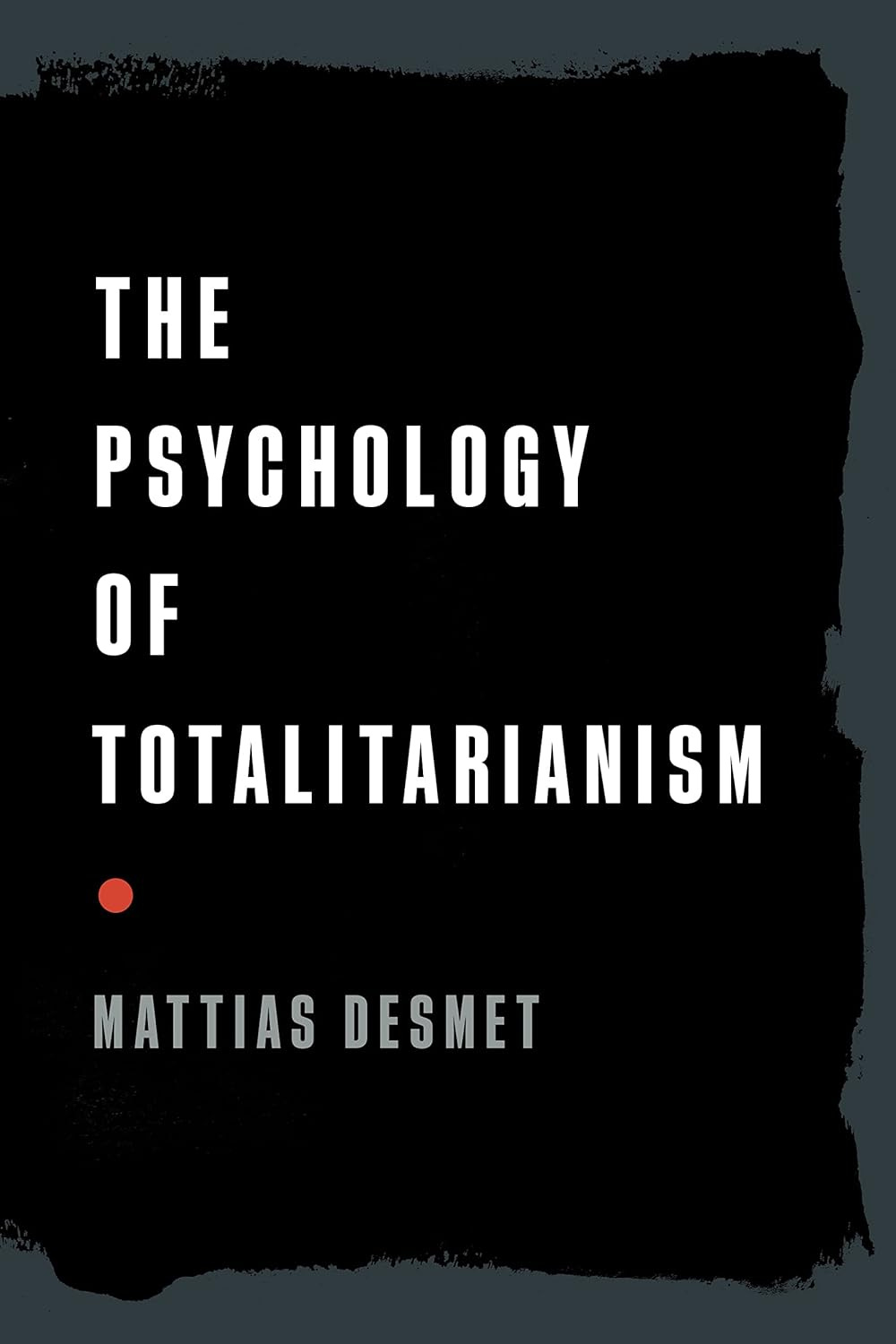Remember to add your book recommendations in the comments below.
Today’s book is:
The Psychology of Totalitarianism by Mattias Desmet
“This is an amazing book . . . [Desmet is] one of the true geniuses I’ve spoken to . . . This book has really changed my view on a lot.”―Tucker Carlson
“[Desmet] is waking a lot of people up to the dangerous place we are now with a brilliant distillation of how we ended up here.”―Robert F. Kennedy, Jr.
The world continues to exist in the grips of mass formation―a dangerous, collective type of hypnosis―as we bear witness to loneliness, free-floating anxiety, and fear giving way to censorship, loss of privacy, and surrendered freedoms. It is all spurred by a singular, focused crisis narrative that forbids dissident views and relies on destructive groupthink.
Desmet’s work on mass formation theory was brought to the world’s attention on The Joe Rogan Experience and in major alternative news outlets around the globe. Read this book―now in paperback, ebook, and audiobook―to get beyond the sound bites!
Totalitarianism is not a coincidence and does not form in a vacuum. It arises from a collective psychosis that has followed a predictable script throughout history, its formation gaining strength and speed with each generation―from the Jacobins to the Nazis and Stalinists―as technology advances. Governments, mass media, and other mechanized forces use fear, loneliness, and isolation to demoralize populations and exert control, persuading large groups of people to act against their own interests, always with destructive results.
In The Psychology of Totalitarianism, world-renowned Professor of Clinical Psychology Mattias Desmet deconstructs the societal conditions that allow this collective psychosis to take hold. By looking at our current situation and identifying the phenomenon of “mass formation”―a type of collective hypnosis―he clearly illustrates how close we are to surrendering to totalitarian regimes.
With detailed analyses, examples, and results from years of research, Desmet lays out the steps that lead toward mass formation, including:
An overall sense of loneliness and lack of social connections and bonds
A lack of meaning―unsatisfying “bullsh*t jobs” that don’t offer purpose
Free-floating anxiety and discontent that arise from loneliness and lack of meaning
Manifestation of frustration and aggression from anxiety
Emergence of a consistent narrative from government officials, mass media, etc., that exploits and channels frustration and anxiety
In addition to clear psychological analysis―and building on Hannah Arendt’s essential work on totalitarianism, The Origins of Totalitarianism―Desmet offers a sharp critique of the cultural groupthink that exists throughout society. He cautions against the dangers of our current cultural landscape, media consumption, and reliance on manipulative technologies and then offers simple solutions―both individual and collective―to prevent the willing sacrifice of our freedoms.
“We can honor the right to freedom of expression and the right to self-determination without feeling threatened by each other,” Desmet writes. “But there is a point where we must stop losing ourselves in the crowd to experience meaning and connection. That is the point where the winter of totalitarianism gives way to a spring of life.”
You can buy the book here.





ALERT: The Supreme Court just lit a match and tossed it into dozens of federal agencies
https://www.vox.com/scotus/357554/supreme-court-sec-jarkesy-roberts-sotomayor-chaos
On Thursday, the Court handed down a 6-3 decision, on a party-line vote, that could render a simply astonishing array of federal laws unenforceable. As Justice Sonia Sotomayor writes in dissent, “the constitutionality of hundreds of statutes may now be in peril, and dozens of agencies could be stripped of their power to enforce laws enacted by Congress.”
The dispute in Securities and Exchange Commission v. Jarkesy turns on whether a hedge fund manager accused of defrauding investors is entitled to a jury trial to determine whether he violated federal securities law, or whether the government acted properly when it tried him before an official known as an “administrative law judge” (ALJ).
The charges against this hedge fund manager, George Jarkesy, are civil and not criminal, which matters because the Constitution treats civil trials very differently from criminal proceedings. While the Sixth Amendment provides that “in all criminal prosecutions” the defendant is entitled to a jury trial, the Seventh Amendment provides a more limited jury trial right, requiring them “in suits at common law” (more on what that means later).
SEC v. Jarkesy could render much of the federal government unable to function.
Congress, moreover, has enacted a wide range of laws on the presumption that many enforcement proceedings may be brought before administrative law judges and not juries. According to one somewhat dated review of federal law cited by Sotomayor, “by 1986, there were over 200” federal statutes calling for trials before ALJs.
Chief Justice John Roberts’s majority opinion in Jarkesy leans heavily into the kind of remedy available to the SEC if it prevails in a suit before an ALJ. Like a suit before a common law court, the SEC sought monetary damages from Jarkesy, and thus this case resembles a suit at common law in that way. As Roberts writes, “money damages are the prototypical common law remedy.”
I read this book. Highly recommend it!